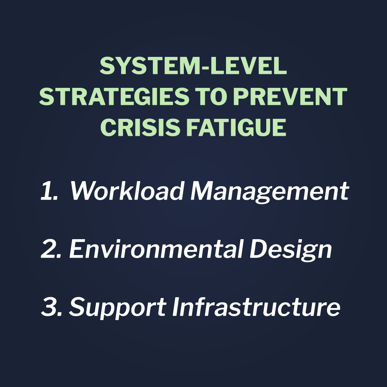In healthcare settings, managing escalating patient encounters isn't just about preventing physical harm—it's equally about protecting the psychological well-being of staff who face these challenges repeatedly. The accumulation of high-stress encounters creates "crisis fatigue"—a state of emotional, physical, and cognitive depletion that undermines both staff well-being and patient care quality.
Understanding Crisis Fatigue
Crisis fatigue develops progressively through repeated exposure to high-stress situations:
- Initial encounters trigger appropriate stress responses with effective recovery
- Repeated exposure begins depleting psychological resources faster than replenishment occurs
- Shortened recovery windows between incidents prevent complete restoration
- Anticipatory stress develops as staff begin expecting difficult encounters
- Emotional blunting eventually occurs as a protective mechanism
The resulting state includes symptoms like emotional exhaustion, decreased empathy, impaired decision-making, hypervigilance, sleep disturbances, and increased irritability, affecting both professional function and personal well-being.
De-Escalation Training as Psychological Protection
Effective de-escalation training provides more than operational skills—it creates psychological protection that reduces crisis fatigue through several mechanisms:
1. Transforming Helplessness into Agency
Vistelar's comprehensive training transforms helplessness into agency by providing:
- Structured frameworks for understanding escalation processes
- Specific verbal techniques for managing escalating behavior
- Clear decision trees for determining appropriate responses
- Team-based protocols for coordinated intervention
- Practiced skills that become automatic under stress
This transformation from helplessness to agency reduces the psychological toll of each encounter while building confidence for future situations.
2. Reducing Cognitive Load
Effective training reduces mental burden through:
- Creating automatic responses through repeated practice
- Establishing clear mental models for assessing escalation risk
- Developing pattern recognition to anticipate behavior trajectories
- Building procedural memory for effective techniques
- Providing structured language that doesn't require in-the-moment composition
This reduced cognitive load preserves mental resources during encounters and accelerates recovery afterward.
3. Building Team Resilience
Individual resilience has limits, but team resilience provides sustainable protection. Comprehensive training builds this collective capacity through:
- Shared terminology for discussing escalation dynamics
- Coordinated response protocols that distribute psychological burden
- Team debriefing practices that process experiences collectively
- Mutual support expectations during challenging encounters
- Recognition of collective achievement in successful de-escalation
Systematic Organizational Protection
While de-escalation training provides essential psychological protection, truly effective approaches require system-level interventions:
1. Workload Management
Staff need adequate recovery time between high-stress encounters:
- Rotation systems for high-risk assignments
- Protected breaks following difficult interactions
- Workload adjustment after particularly challenging incidents
- Leave policies that acknowledge psychological recovery needs
- Shift scheduling that prevents chronic sleep disruption
2. Environmental Design
Physical environment significantly affects psychological burden:
- Clear exit pathways that reduce feeling trapped with escalating patients
- Quiet recovery spaces for use following difficult encounters
- Reliable alarm systems that provide confidence in backup availability
- Environmental features that reduce aggression triggers
- Appropriate staffing levels for high-risk areas
3. Support Infrastructure
Effective support systems include:
- Peer support programs with trained providers
- Critical incident debriefing following significant events
- Professional mental health access for those needing clinical support
- Supervisor training in recognizing crisis fatigue signs
- Normalized help-seeking culture removing stigma from support utilization
Measuring Protection Effectiveness
Several metrics can help organizations assess their crisis fatigue prevention efforts:
- Staff well-being surveys using validated burnout measures
- Incident debriefing feedback on psychological impact
- Performance metrics potentially affected by fatigue
- Help-seeking behavior related to stress management
- Turnover patterns in high-risk departments
The Business Case for Crisis Fatigue Prevention
Beyond ethical considerations, preventing crisis fatigue delivers significant business benefits:
- Reduced turnover costs from improved retention
- Decreased absenteeism related to stress conditions
- Improved patient experience through maintained empathy
- Enhanced team cohesion supporting operational effectiveness
- Reduced medical errors from maintained cognitive function
The Path Forward
This Mental Health Awareness Month presents an opportunity to recognize crisis fatigue as a significant threat requiring systematic intervention. By viewing de-escalation training as both a safety measure and a psychological protection strategy—and by implementing supporting systems for recovery and resilience—healthcare organizations create sustainable environments even in high-stress settings.
The most effective approach recognizes that addressing crisis fatigue requires more than individual coping strategies—it demands systematic attention to organizational factors that either deplete or restore psychological resources. When this shift occurs, healthcare organizations create environments where staff can maintain both well-being and effectiveness even amid the inevitable challenges of patient care.







